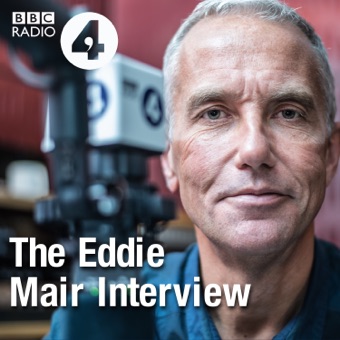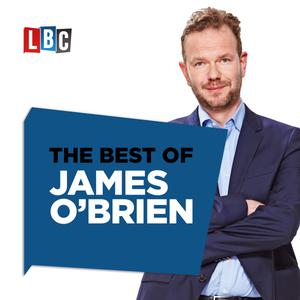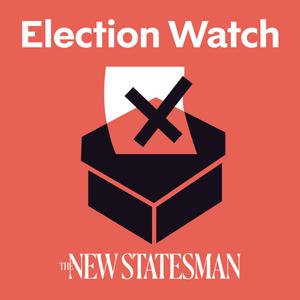
The Eddie Mair Interview
BBC Radio 4
Eddie Mair speaks at length to people with interesting things to say, for Radio 4's PM.
- 33 minutes 48 secondsCIA Moscow Veteran: Putin is a consummate liar
John Sipher spent 28 years with the US National Clandestine Service.
Mr Sipher spoke to Eddie Mair about his life undercover, why he's kept a brick from Osama Bin Laden's house, torture, and the Sergei Skripal poisoning.
4 April 2018, 3:31 pm - 14 minutes 29 secondsI talk to my dead friend
Artificial intelligence is already a big part of our lives, whether or not we are aware of it, and it will only become more significant.
But could it ever help us with our most tender human emotions, like when we are grieving?
Eugenia Kuyda is a tech entrepreneur and when her friend Roman Mazurenko died suddenly, Eugenia used machine conversation to bring him back to life.
She told Eddie Mair about the app she created to do this called Replika, which describes itself as an artificial intelligence friend that's always there for you.
(Photo: Roman Mazurenko and Eugenia Kuyda Credit:Eugenia Kuyda)
.
16 February 2018, 5:50 pm - 18 minutes 11 seconds'I have been across the whole spectrum of crime and I've paid a price for it'
On New Year's Eve four young men were stabbed to death in separate incidents around London. It brought the total number of fatal knife attacks in the Capital to 80 in 2017.
Many of these incidents are due to gang rivalries.
Jermaine Lawlor was a member of a gang in East London. He was first arrested at the age of 11, but tells Eddie Mair that seeing "friends being murdered, made me think about my life".
Now 26, he's a youth worker and has set up a service to help those that remind him of his younger self.
(Photo:Jermaine Lawlor Credit: Jermaine Lawlor)
12 January 2018, 5:29 pm - 23 minutes 42 secondsHow to make sure your last wishes are respected
What would you like to happen if you become very ill or severely incapacitated? What can you do now to make sure your wishes, whatever they are will be respected should that time come?
Professor Jenny Kitzinger is from the Coma and Disorders of Consciousness Research Centre, Cardiff University which researches how best to ensure that incapacitated patients have their last wishes respected.
Jenny's sister Polly had a car crash in 2009 which has left her with devastating brain injuries. Her family knew she would not want life-prolonging treatment but as Jenny told Eddie Mair, "without an advance decision (document) we found that those views were not respected".
(Photo: Professor Jenny Kitzinger, Coma and Disorders of Consciousness Research Centre, Cardiff University. Credit: J Kitzinger)
2 January 2018, 5:33 pm - 44 minutes 16 seconds'History is about the future, politics is about the past'
Sebastian Balfour, a historian and Emeritus Professor of Contemporary Spanish Studies at the London School of Economics, was PM’s trusted guide to events in Catalonia before, during and after the disputed independence referendum.
In an extended interview, Professor Balfour talks to Eddie Mair not about his day job, but about his fascinating life including being rescued as a little boy from a Japanese internment camp and living in America in the1960's where he bought and sold antique cars.
(Photo: Historian Sebastian Balfour Credit: Sebastian Balfour)
15 December 2017, 5:27 pm - 12 minutes 52 secondsMy twenty-two months of 'hell' in a Dubai prison
Dubai in the United Arab Emirates is an increasingly popular destination for international sun-worshippers and shoppers.
Recently when Dubai has been in the news, it has not been for bargains or top tanning tips.
This week a young British expat, Asa Hutchinson, was said to be facing jail in Dubai after witnessing a fight.
There were more headlines about Jamie Harron, a 27-year-old Scot who was sentenced to three months in jail in Dubai for touching a man's hip. After spending three and a half months awaiting the outcome of the case, he was exonerated and able to return home.
But what is it like to be caught up in the criminal justice system in Dubai?
David Haigh is someone who knows. He is a lawyer and was a business executive. He says he is an innocent man who was wrongly imprisoned. He was arrested at the airport in Dubai on a trip to visit a former employer, GFH, about further work. But GFH - an investment bank based in Bahrain - had accused him of stealing money from them. And they strongly deny that the basis of his subsequent conviction was false.
David Haigh told PM about his arrival in Dubai.
(Photo: David Haigh Credit: David Haigh)
1 December 2017, 5:45 pm - 9 minutes 18 secondsMy journey as a Rohingya
The treatment of Rohingya Muslims in Myanmar has led to worldwide condemnation, with the US threatening sanctions.
Bangladesh, which has taken in hundreds of thousands of Rohingyas who’ve fled their homeland, has now signed a deal to return them to Myanmar.
Nijam Uddin Mohammed is a Rohingya Muslim. He spent 18 years in a refugee camp in Bangladesh, but now lives in Bradford.
He tells Eddie Mair about fleeing Myanmar when he was a boy; and about his return to visit the camps he used to live in.
(Photo courtesy of Nijam Uddin Mohammed)
24 November 2017, 3:20 pm - 20 minutes 32 seconds'Those tweets were from someone lashing out at the world around him'
The magazine Gay Times has sacked its new editor over comments he made on social media in the past.
Josh Rivers was appointed last month. The first non white editor in Gay Times history.
But an investigation by Buzzfeed News found several tweets posted by Josh Rivers between 2010 and 2015 which it said would shock many people.
Although he tweeted a statement which described his messages as "horrible", "hateful" and "abhorrent" and expressed sorrow at causing any offence, the Gay Times sacked him.
He told Eddie Mair that the texts came from a place of "deep self-loathing that I've worked hard to overcome". He also said "this isn't about me it's about, beautiful, sensitive, valuable people who have been hurt by this and they need to heal - if I can help them do that, I'd love to but until then they have to do what they have to do to get through this."
(Photo: Josh Rivers Credit: Gay Times)
16 November 2017, 6:06 pm - 14 minutes 27 secondsThe 'Battle-Scarred' comedian
As we approach Armistice Day, followed by Remembrance Sunday, we talk to an American army veteran who is the host of a new podcast "Battle Scars", in which he interviews people who have been in war zones.
Born in Vietnam, Thom Tran moved to the US as an infant. He enlisted in the United States Army at 18 years old, before he had finished high school. He spent eight years in the army including 12 months in Iraq.
These days he is a musician, and a stand-up comic, but in his new podcast he uses his own history to help other former soldiers talk openly about their experiences on the front line.
Based in Los Angeles, he spoke to Eddie Mair after his early morning trip the gym.
(Photo: Thom Tran on stage Credit: Thom Tran)
8 November 2017, 5:53 pm - 8 minutes 10 secondsStourhead in autumn is 'a living work of art'
Since 2008 Alan Power, head gardener at Stourhead in Wiltshire, has joined Radio 4's PM programme to tell us about the autumnal view.
This year, there was something extra to talk about.
(Photo: Stourhead. Credit: PA)
31 October 2017, 10:41 am - 27 minutes 15 secondsRadio 4 helped diagnose my cancer
Steve Hewlett chronicled his experience with oesophageal cancer weekly on PM in 2016.
Steve believed that by using his journalistic skills to investigate and understand his own cancer, he would be doing some good for himself and perhaps for people listening to PM.
He was right on both counts.
Lisa Griffith wrote to the programme about her husband Paul. After hearing about the symptoms on PM, Paul went to the doctor and was diagnosed with oesophageal cancer.
(Photo: Paul Griffith. Credit: Lisa Griffith)
16 October 2017, 4:05 pm - More Episodes? Get the App
Your feedback is valuable to us. Should you encounter any bugs, glitches, lack of functionality or other problems, please email us on [email protected] or join Moon.FM Telegram Group where you can talk directly to the dev team who are happy to answer any queries.
 The Best Of James O'Brien
The Best Of James O'Brien
 Coffee House Shots
Coffee House Shots
 Anger Management with Nick Clegg
Anger Management with Nick Clegg
 Election Watch: The New Statesman podcast | daily throughout the UK general election
Election Watch: The New Statesman podcast | daily throughout the UK general election
 Red Box Politics Podcast
Red Box Politics Podcast